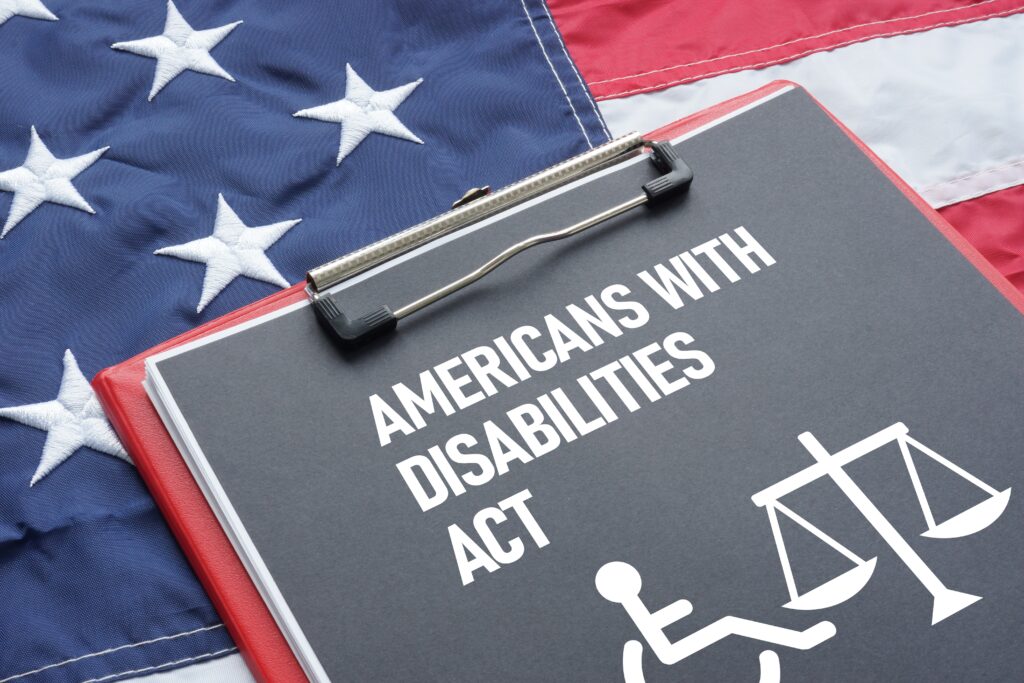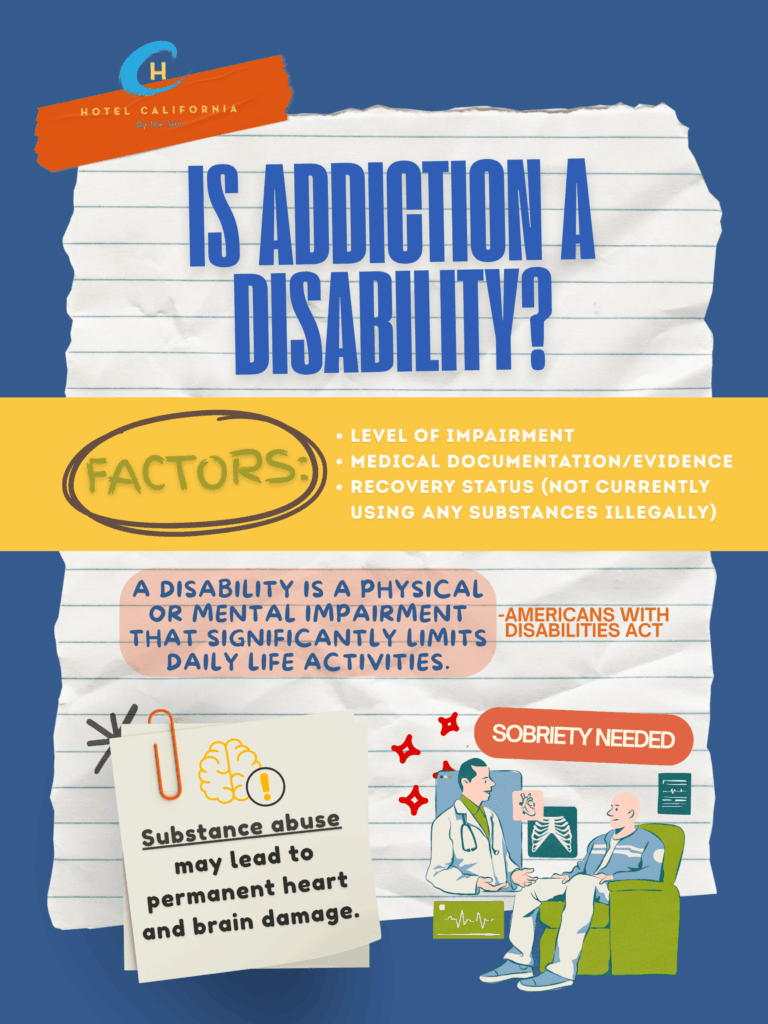Is Addiction a Disability?
Substance use disorder or addiction is a serious health issue affecting millions of people. Is addiction a disability? Addiction can cause psychological and physical impairments to a person’s well-being, making daily life events more difficult. Under the Americans with Disabilities Act and the California Fair Employment and Housing Act, these agencies can provide legal protections for those with disabilities that include ones related to substance use disorders.

In California, substance use disorders, including drug addiction and alcohol addiction, are conditions that can qualify as a disability if they prevent a person from working. Disability compensations allow those who are struggling with substance use disorders to access benefits that support them while they seek treatment and recovery.
Addiction is a complex condition that affects the brain and behavior, which is characterized by drug use and its harmful consequences of drug use. While having an addiction itself isn’t technically a disability.
Addiction is considered a brain disorder or mental illness, but not necessarily a disability. However, the impairment it causes physically and mentally can be classified as one. For example, if drug or alcohol abuse causes co-occurring mental health impairments or results in organ damage or failure, a disability can be diagnosed.
What is a Disability?
Some people are born with disabilities, whether they are cognitive or physical ones. Some people experience life-limiting conditions. And some people become injured and can experience damage, resulting in psychological or physical impairment.
In the US, an estimated 54 million people experience some form of disability. Of that number, about 9% have a substance use disorder as well as a coexisting disability. Addiction and disability have a close relationship.

Americans with Disabilities Act
For people who have an addiction to drugs or alcohol, the ADA only protects a person who is in recovery and no longer engaged in the current illegal use of drugs. Illegal use of drugs means the use of illegal substances such as heroin, cocaine or misuse of prescription medications. A person in recovery is a person no longer engaged in illegal use of substances and has participated in supervised rehab programs.
The Americans with Disabilities Act (ADA) is a program that ensures all people with disabilities have the same rights and opportunities as everyone else. The ADA is a civil rights legislation that affords people with disabilities equal opportunity, economic sufficiency, independent living and participation in daily life.
The ADA was signed into law on July 26, 1990. It prevents discrimination against people with disabilities in all aspects of public life including work, education and transportation. This also include all public and private places where the public goes to access any goods and services. The law is meant to ensure that people with disabilities have the same rights and opportunities as everyone else.
In some cases, protections include people with alcohol and drug addictions and people in recovery from opioids and other drugs.
What is considered a disability under the ADA? If a person has a physical or mental impairment that significantly limits one or more major life activities (major life activities are acts such as walking, seeing, caring for oneself, learning, thinking and communicating). This includes a person who has an addiction to substances. If a person has a history of impairment that significantly limits one or more major life activities. This includes a person in remission from cancer or from illegal drug use.
Check Your Insurance Coverage for FREE
Find out if your insurance covers addiction treatment in minutes. We accept most insurance!
Is Addiction a Disability?
Under certain laws and policies, addiction can be considered a disability because it is an impairment that affects the brain and neurological functions. Under the Equity Act of 2010, substance use disorders aren’t categorized as a disability. However, the consequences of addiction can result in a disability such as a co-occurring mental health disorder.
In California, the California State Disability Insurance (SDI) is a partial wage replacement insurance plan for workers who suffer from a disability that prevents them from being able to work. SDI is a state-mandated program that most California employees contribute to through payroll deductions.
Under the Unemployment Insurance Code that governs the SDI program, there are specific policies that address disabilities resulting from substance use disorder. Ultimately, most cases of substance use disorder are treated as a disability under California law. The program covers two main benefits: Disability Insurance (DI) and Paid Family Leave (PFL).
DI benefits are designed to replace income lost when a person cannot work due to work-related illness, injury or pregnancy. A substance use disorder falls under non-work-related illnesses, but can be eligible for DI benefits. The general eligibility requirements for SDI benefits include:
- Must have paid in SDI program during their base period, which is about a 12 month period
- Must be unable to perform their regular work duties due to physical or mental conditions that can be certified by a licensed health care provider
- Must submit their claim for benefits within the required timeframe
The relationship between Addiction and Disability
There is a close relationship between addiction and disability. People who abuse drugs and alcohol are at higher risk of becoming disabled as a result of harm and injury from drug use. Those who have addictions are more likely to become disabled, either through accidental injury or through long-term side effects of substance damage to their bodies.
According to research, people with physical disabilities experience substance use disorders at 2-4 times the rate of the general population. The disability and lack of support can easily discourage a person’s happiness and sense of purpose. This creates a depressive state of mind, where in order to offset the emotional disorder and they tend to self-medicate through substances like drugs and alcohol.
Those who have mental and physical disabilities face unique stressors. On a social perspective, they can be seen as outsiders because they are different. They are unable to qualify for certain jobs and careers. They are uncle to participate in certain types of activities to the extend that they would like. And they are sometimes limited the access to certain benefits due to their cognitive impairment. This can also lead to self-medication through drugs and alcohol.
Patients who have disabilities also use prescription medications to treat painful conditions, which can also potentially lead to the development of a substance use disorder. Prescription opioids are very potent and highly addictive.
On the other hand, substance use disorders and alcoholism can lead to the development of a disability. Certain forms of alcohol, when abused, can cause blindness. Long-term alcohol abuse can also cause hepatitis. Inhalant abuse can cause nerve damage. And long-term smoking of marijuana can lead to lung damage. All of these are forms of disabilities caused by substance addiction.
Reach out to Hotel California by the Sea
We specialize in treating addiction and other co-occurring disorders, such as PTSD. Our Admissions specialists are available to walk you through the best options for treating your addiction.
Treatment for Substance Use Disorder
Mental impairment and neurological damage are common consequences of substance abuse. This can lead to the development of a disability. In the US, under the ADA, addiction to drugs and alcohol is recognized as a disability if the person is no longer using illegal substances and is receiving addiction treatment. Addiction and disability often have a very close relationship and can be the cause and catalyst for one another.
Professional behavioral treatment programs such as Hotel California by the Sea provide substance use disorder treatments and treatment for co-occurring mental health disorders. We offer treatment at all levels of care including detox, residential, PHP and IOP. We utilize evidence-proven methods that include CBT, DBT, group therapy and family therapy. Hotel California by the Sea helps clients reach their goals of recovery and overcome their addiction.
References:
https://adata.org/factsheet/ada-addiction-and-recovery-and-government
https://www.addictioncenter.com/addiction/disability
https://pmc.ncbi.nlm.nih.gov/articles/PMC10961953
https://rehabclinicsgroup.com/are-alcoholism-and-drug-addictions-disabilities
https://zinniahealth.com/substance-use/addiction/disability-or-not
https://www.addictiongroup.org/addiction/disability/


